The Power of Online (Taken Offline) Community on Display at Podcamp Topeka
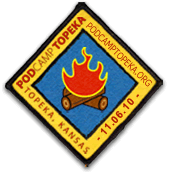 When I learned that I would be delivering my first keynote presentation at Podcamp Topeka earlier this month, I was excited. But, what got me more excited was how well the people behind the event were treating me. I really appreciated their faith and investment in me. I liked David Lee King’s vision for the event, as well.
When I learned that I would be delivering my first keynote presentation at Podcamp Topeka earlier this month, I was excited. But, what got me more excited was how well the people behind the event were treating me. I really appreciated their faith and investment in me. I liked David Lee King’s vision for the event, as well.
So, I decided to go crazy for them and do something that was not part of my deal with them and that most speakers don’t do – something that I myself had never done, either, because no one had ever had put this level of resources into me before now. I decided to invest an incredible amount of time into bringing people to the event.
All speakers promote the events that they participate in. At least by putting it on their speaking page or something like that. Many blog about their engagements, tweet about them, share them on Facebook, etc. And some go even a bit farther and I’ve done that myself, too.
But, what I did in this case was more than that. There were a lot of different things that went into the approach, but the biggest part of it was just being available and making myself available to do press or simply talk to people, either set up by myself or set up by the organizing team (which included Brandon Sheley, Alissa Sheley, Lisa Coble-Krings, Bill Ludwig and Joe Cheray).
From the point I was announced as the keynote (51 days prior to the event), I monitored closely a Twitter search that told me anytime someone mentioned “#PodcampTopeka,” “@PodcampTopeka” or “Podcamp Topeka” and I spent a lot of time talking to people about the event. Had a question? Fair chance I answered it. Thinking of coming? I tried to help you make the decision. That stream was a part of my life for around 2 months.
I asked AMACOM, the publisher of my book, to send the conference 25 books to giveaway to the next 25 paying registrants. I have never asked AMACOM for that many books (or close to it). But, they said yes, which I was thankful for.
I also e-mailed a number of people. I e-mailed local press, I e-mailed the mayor, I e-mailed the Greater Topeka Chamber of Commerce and a bunch of other people. Podcamp Topeka was a low budget event meant to enrich the community, so there was not really much of a marketing budget. With an event like this, I decided that the best thing that I could do was reach out to people in Topeka and surrounding areas, who were connected with others, and share the event with them, hoping that they would see the value and would help spread the word to their connections.
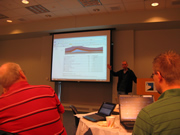 I copied David on these e-mails and know he got a kick out of them because of their length and general enthusiasm. For me, making the value proposition wasn’t hard. You get a days worth of programming, access to veterans in the industry who speak nationally and a light breakfast and lunch for $6.26. Yes, $6.26. ($1.26 of which goes to EventBrite, the event registration service the conference used).
I copied David on these e-mails and know he got a kick out of them because of their length and general enthusiasm. For me, making the value proposition wasn’t hard. You get a days worth of programming, access to veterans in the industry who speak nationally and a light breakfast and lunch for $6.26. Yes, $6.26. ($1.26 of which goes to EventBrite, the event registration service the conference used).
My general joke pitch was something like, “Do you plan to eat on Saturday? If so, cool. Come and eat breakfast and lunch and you’ll get your money’s worth. If it’s not going well after that, you can go home early. I don’t think you’ll want to, but you have the option.”
I connected with people in surrounding areas and offered them what I could, telling them that I was open to ideas or suggestions. Can I help in any way? Can I do an interview or do a live presentation for a group? Can I send you some books? Do you know anyone that I can speak to locally about the event? And so on and so forth.
There is a sensitive line that I tried hard not to cross, which is the line of appropriateness or asking for too much. For the most part, I was e-mailing people I did not know previously and asking them to help promote an event I was speaking at. Do it wrong and you come across as someone looking to take advantage of them and their community. So, the aim is to be respectful, to explain the value and ask for their assistance and offer them yours.
As the event drew closer, and I was working on my slides, I realized that I had the perfect closing point, the perfect embodiment of community. The Podcamp Topeka community. A large part of the reason that the event happened and was, in my opinion, very successful, was this community of people and organizations that helped to support the event. Some the conference engaged, some I engaged, some neither of us engaged.
I wanted to talk about each of them, or as many as I could, not only to highlight them but to illustrate this powerful example of community and of all of the pieces of the puzzle. I did this through a series of slides that I later collectively referred to as the “one slide that took me 3 hours that I will never use again.”
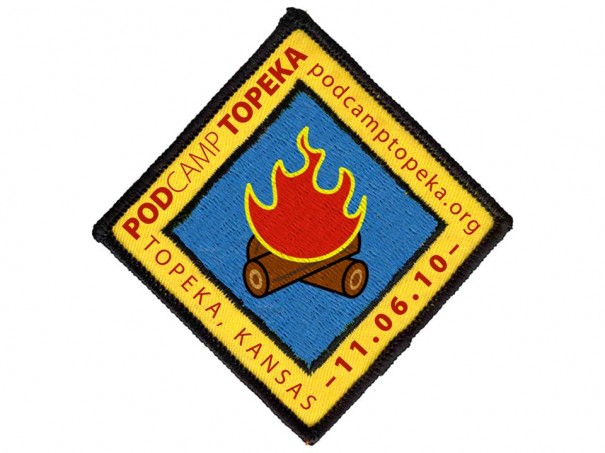
It began with just the Podcamp Topeka logo surrounded by white space.
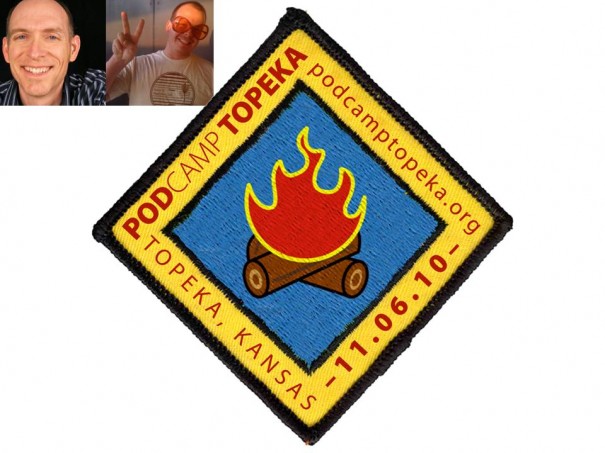
After I booked the keynote, I was thinking about who I knew in the area and who I could reach out to about the event. I realized that the only two people I could think of were David Lee King and Brandon Sheley. David being the organizer of the event and Brandon being on the organizing team.
I had met David online and we had shared a meal at South by Southwest Interactive and I had provided advance praise for his book, “Designing the Digital Experience.” Brandon had purchased my book and had a lot of kind things to say about it and we had chatted online at numerous points.
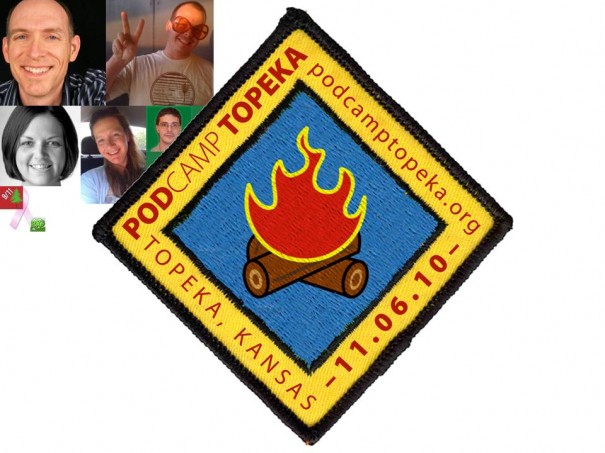
We then have the remainder of the organizing committee, who I came to know through our numerous e-mail conversations. This includes Alissa Sheley, Lisa Coble-Krings, Bill Ludwig and Joe Cheray. Among their conference duties, Alissa worked with her employer and conference sponsor Jones Huyett Partners to book interviews for me with the local CBS and NBC affiliates. Lisa set up a live chat event with the ABC affiliate, as well.
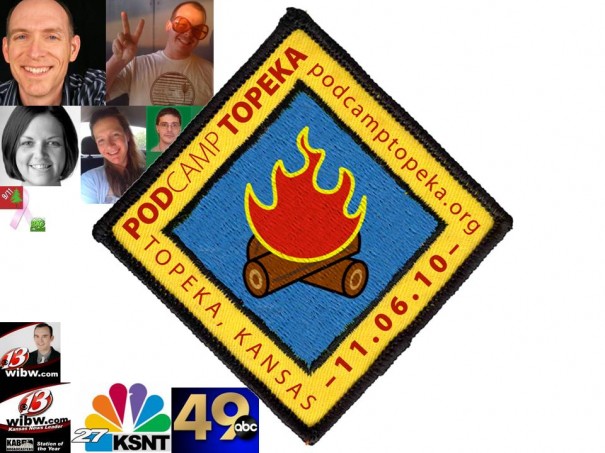
The community comes in all shapes and sizes. It’s not just people, it’s organizations of people. This includes traditional media who agreed to cover the event, in one way or another. Television stations WIBW (including Josh Mabry, who I did an interview with), KSNT and KTKA all did so.
I have found, in previous circumstances, that if you do one local television station, others might not want to talk to you because it’s not as exclusive. But, that was not the case here and I appreciated that.
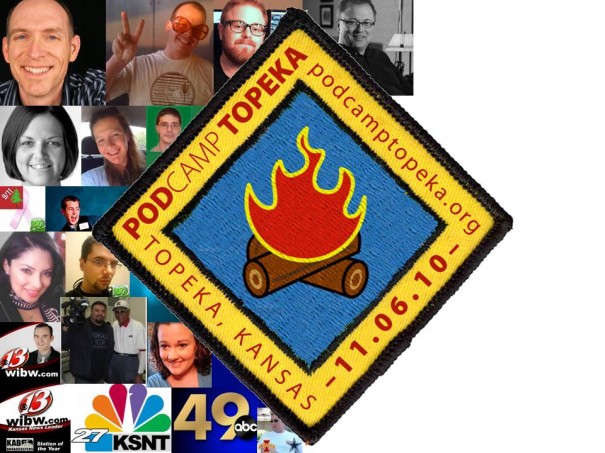
And here is where it really begins to fill in. Promoting an event like this is all about community, it’s all about people and reaching out to people connected in their communities that can help spread the word about the event. Not because they have to, but because they see the value and want to do so. Among the people I reached out to:
Vilma Bonilla and Eric Myers of Overland Park and Olathe, Kansas. Vilma was tweeting about the event and I looked her up and reached out to her to ask for her help. She helped spread the word online and let me speak (via Skype) to the internet marketing group that her and Eric bring together regularly. Several members of that group were at the event.
Laz Abalos of Kansas City, Missouri. Laz was kind enough to have me on the NextGenMedia Podcast, co-hosted by Frank Barrett.
Amy Kiel of Kansas City, Missouri. Amy was also tweeting about the event, deciding whether or not to come and once she decided to do so, I reached out and asked for her help in spreading the word.
Grant Griffiths of western Kansas. Funny thing is I knew Grant! I just didn’t know he was from Kansas. We’d chatted online and met in person a few times at conferences. He saw me tweeting and told me he was in Kansas and I asked for his help. Specifically, I asked if he’d consider sponsoring the event. And he did so with no hesitation. It’s not like we’re best friends. We’re acquaintances and we haven’t spent all that much time together. But, he saw the opportunity to support a Kansas event and me and he did so and that meant a lot.
Also included on this slide is Jarod McAferty and T-Rave. Jarod was talking about the conference a lot on Twitter and I definitely noticed that and appreciated it. T-Rave recorded a great video about the conference, even though he couldn’t make it, and I chatted with him via e-mail about it, as well. I asked him what his real name was, so that I could mention him and he told me to just stick with T-Rave because that’s how people know him.
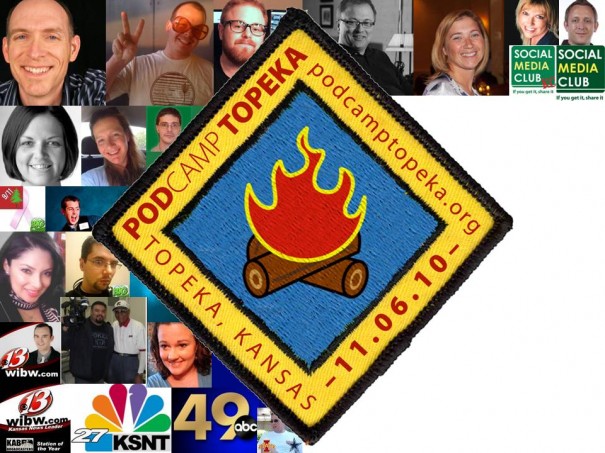
As I asked people for advice on who else I should speak to, a lot of people mentioned Social Media Club Kansas City (headed by Lisa Qualls) and Social Media Club Lawrence (Ben Smith). But, a funny thing happened. At least four people e-mailed Lisa (and maybe Ben) on my behalf. Sorry about that – I didn’t really mean for them to receive that many messages! Heh. But, thankfully, everyone was cool with it.
Lisa had me on for a live interview (assisted by Kris Colvin) and Ben promoted it.
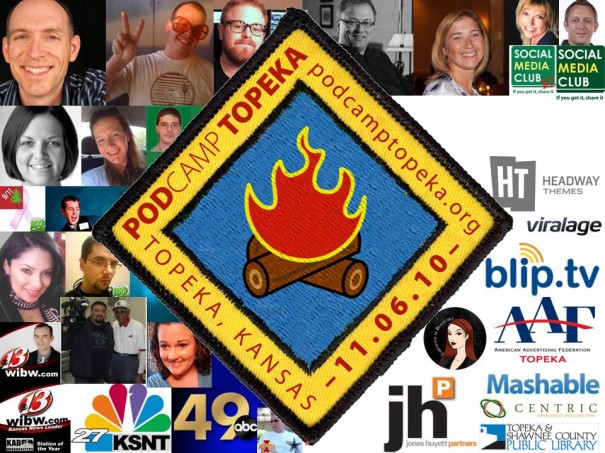
As I mentioned earlier, the community is made up of all sorts of players and one key component is the sponsors. Without the sponsors, there wouldn’t have been an event.
Podcamp Topeka was sponsored by the Topeka & Shawnee County Public Library (the venue where it was hosted and the nicest library I can ever recall being in), blip.tv, Headway Themes (the company that Grant co-founded with his son, Clay), the Topeka chapter of the American Advertising Federation, WIBW, Centric Management and Consulting (which includes Brian Pitman), Librarian in Black, Viral Age, Mashable and Jones Huyett Partners.
One note on Viral Age: it’s Joe Ward’s project and I have chatted with him online a little bit. I don’t know him all that well, but largely due to me mentioning the conference so much, he came through with a sponsorship. He didn’t attend the event, isn’t in the area and his product hasn’t even launched. I thought that was pretty great.
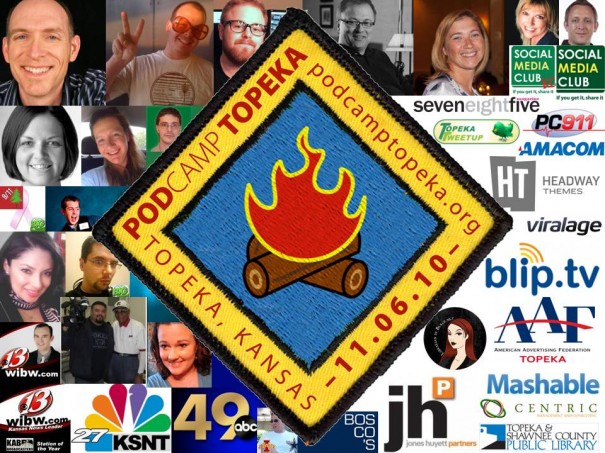
And then there were a few other organizations that played a part. After the event, we had a Topeka Tweetup, held at Bosco’s and sponsored by PC911 of Kansas and seveneightfive magazine. Finally, as I mentioned earlier, my publisher AMACOM was kind enough to agree to send those 25 copies of the book, which helped promote the event.
So, that is the three hour slide that I will never use again. But, it was totally worth it. This is community, in a very real, face-to-face form. Community is what propelled the event to a large jump in attendance and is one of the key components (along with David’s vision and a lot of hard work) that led to it being such a great time and experience.
Thank you to everyone I mentioned above and everyone else who helped to make Podcamp Topeka a success and my time in the area enjoyable.
(As a community related aside, a long time staff member and moderator on KarateForums.com, one of the communities that I manage, drove 3 hours from Hays, Kansas to be at the event so that we could meet for the first time. His name is Brian Walker and it was great to be able to meet him and his family in person and chat. I even brought him in on a breakout session I led, “Moderating an Online Forum,” where we talked about how we do things at KarateForums.com. It was great).
Community is diverse and it is varied. It’s individuals, it’s media, it’s corporations, large and small. And when it all comes together in a meaningful way, powerful things can be achieved.
